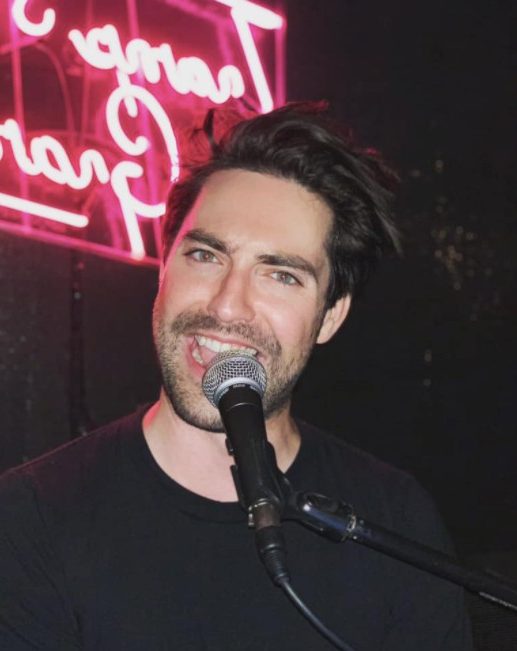

Today we’d like to introduce you to Patrick Boylan.
Hi Patrick, please kick things off for us with an introduction to yourself and your story.
Brief!? Oh god, I’ve been everything BUT brief in my life. But let’s try this, here we go. Love me a good challenge.
Born and raised in Chicago to a mother in news, and an actor father. Did all the sports. Terrible at them. Started playing piano at age 10. Hated it, but kept going cause my parents grounded me if I didn’t practice.
“It’s a lifelong passion, Pat. You sure you want to do this?!”
“Absolutely! I love it!”
Cut to – 3 years later. Me whimpering at the piano trying to practice Fur Elise. Hated it. But I kept going and eventually loved it.
Anyway, did theater in high school, went to college for acting, pivoted to music therapy pivoted to Sociology, and graduated with a B.S. in Sociology. Big fan of that major. So happy to have that in my arsenal of perspectives – The Sociological Perspective.
Moved out to LA, got a serving job, and did the actor thing. Got some pretty decent roles, but it still wasn’t paying the bills. Started getting depressed at year six, and the love of my life, Weslie Lechner, said, “why aren’t you playing piano for a living?”
I said, “it’s too close to my heart, I can’t make it my job!”
She said, “Go F*#$ yourself, you’re an actor! You live your life with your heart on your sleeve! Go try it and stop being a little b#&*$.”
I said, “Woooaaaah, Wes, what’s with the tone!? Fine. I’ll try.”
Three months later, I was playing at Tramp Stamp Granny’s and had three other piano and accompanist residencies at bars, restaurants, and schools in LA.
The pandemic hit, and I pivoted into audiobook narrating. Voiced the titular character in a comedy podcast called Private Detective Randy Randy that Weslie wrote. Loved it! Turned out great (you can listen to it anywhere you get your podcasts)! Started getting even more into VO and narrating, and have done 25 books since. I still act a bit – doing some stuff for a few brands, and random film projects, but nothing major. Narrating, piano, and building an AI-driven music education app called MuseFlow are my passions and professions now.
Would you say it’s been a smooth road, and if not what are some of the biggest challenges you’ve faced along the way?
Oh hell no! Ups and downs baby, ups and downs. Gotta learn to work through the waves of life. Gotta duck under them or go over them. Or… better yet, ride them. Just like every wave ever, this too shall pass.
Totaled cars, zero money and hungry, depression, sudden deaths of family members and friends, overdoses… all of those have been in my past. Just rode them out, went to therapy, stitched up what was necessary, worked through it, and came out stronger on the other end. I know I’m privileged to say that. A lot don’t come out better for it.
My advice – never say, “I can’t,” and “I should.”
Instead, ask, “how can I,” and say “I will/won’t.” Be action and goal-oriented, write your plans down in a calendar and don’t tell a ton of people about them (that gives you a dopamine kick that is the same as actually doing it), and above all else, be truthful and honest with yourself. Two of the wisest quotes in my opinion come from the same musical and the same song:
“The choice may have been mistaken, the choosing was not.”
“Anything you do, let it come from you, then it will be new. Give us more to see.”
“Move On” from Sunday in the Park with George by Stephen Sondheim.
We’ve been impressed with MuseFlow – an AI-driven music education app, but for folks who might not be as familiar, what can you share with them about what you do and what sets you apart from others?
Remember when I said my parents grounded me because I hated practicing piano? Looking back, it was because I hated the way I was being taught.
There’s a concept in music education called Sight Reading – the ability to read music at first sight. And there’s data that proves if you increase your sight reading ability, your joy of learning to play songs becomes higher (1).
With that philosophy in mind, three software developers, a data scientist, a music teacher, and myself, are creating MuseFlow – an app that teaches music through sight reading. We give you a new skill to learn (a new note, a new rhythm, etc), then give you music you’ve never seen before that never repeats. MuseFlow adjusts the tempo and complexity of the music to how you are doing, keeping you in a flow state where the challenge of the level is just outside your skill level. This keeps you growing and playing but not discouraged.
Results from our early-stage trials are quite positive, showing that MuseFlow is more fun, engaging, and equally as effective (if not more so) than traditional methods of teaching.
We cannot wait to release this to the public. And if you’re reading this, we hope you’d be interested in trying it out yourself.
So, before we go, how can our readers or others connect or collaborate with you? How can they support you?
Sign up for our mailing list at MuseFlow.ai/mailing-list to stay updated on our progress and get early access to our prototype! We’ll email you when it’s ready for you to try.
Contact Info:
- Website: www.MuseFlow.ai
- Instagram: @pboylan_official




Image Credits
Jill Petracek, Ballad Box Music, and Weslie Lechner














